The Benefits of Montessori Education: Life Skills and Character Building
The benefits of Montessori education are numerous, such as fostering independence, curiosity, and a lifelong love of learning in children. Dr. Maria Montessori developed this child-centered approach. It emphasizes hands-on activities and self-directed learning within a carefully prepared environment to meet each student’s unique needs. By encouraging exploration, critical thinking, and respect for all, Montessori education nurtures well-rounded individuals with the essential skills to thrive in all aspects of life.
Read on to learn about the benefits of Montessori education in the children’s overall development.
Benefits of the Montessori Method
The Montessori method is a child-centered approach focusing on the child’s holistic development. It recognizes that each child is unique and learns at their own pace. By providing a prepared environment that encourages exploration and discovery, Montessori education enables children to develop essential life skills and character traits that will serve them well throughout their lives. Following are some of the benefits of Montessori education:
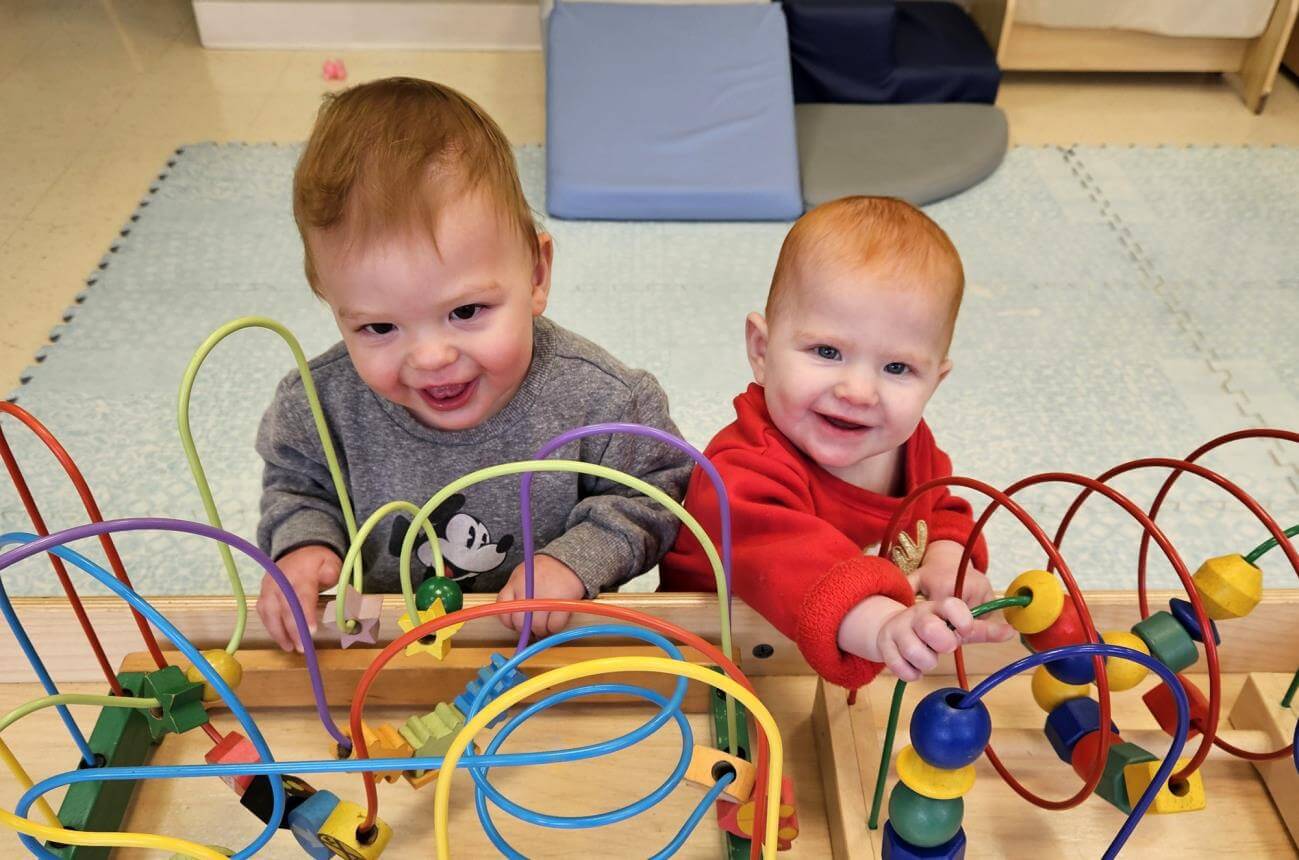
Fostering Independence & Self-Discipline
One of the benefits of Montessori method is that it makes children independent. Children are encouraged to take charge of their learning and do things that help them rely on themselves. They learn everyday skills like getting dressed, making their own snacks, and taking care of their space. This helps them feel responsible and confident. It gives them the skills they need to handle the world around them.
The Montessori method also helps children develop self-control. Children can choose what they want to do and work at their own speed, but they also learn to follow the rules of the classroom. This balance between freedom and responsibility helps children learn to control themselves. This is important for doing well in school and life.
Nurturing a Love for Learning
The Montessori classroom also boosts children’s love of learning. Children are free to explore what they like and are curious about, with the help of kind and smart teachers. They use hands-on materials and real experiences to understand hard ideas in a way they can touch and see. This makes learning meaningful and fun. It makes children love learning for their whole lives and want to be active in their own education.
Developing Social & Emotional Intelligence
A Montessori school in Flower Mound TX cares a lot about helping children grow socially and emotionally. In classrooms with children of different ages, and through learning together, children learn to respect others, understand how others feel, and solve problems with others. These skills are very important for having good relationships and dealing with the hard parts of getting along with others.
The Montessori way also encourages children to express their feelings in a healthy and helpful way. Teachers help children recognize and manage their emotions. This helps children be smart about their feelings and understand themselves from a young age.
Fast Facts on Benefits of Montessori Education
- According to the National Center for Montessori in the Public Sector, there are now some 500 publicly funded Montessori schools across the United States, up from fewer than 300 in 2000. The number of private Montessori schools, estimated to be around 4,000, is also rising.
- The research tested approximately 140 students at the start of the preschool found that both the Montessori and non-Montessori kids began at age three with similar achievement scores. The 70 students who attended the Montessori schools advanced more rapidly on math and literacy tests over the next three years.
- Randomized control design studies have found superior outcomes on academic and pre-academic assessments for children who attended Montessori preschool and elementary schools compared to non-Montessori control group children.
- Research from France found a positive impact of Montessori education on creativity. In one study, children who attended a Montessori program performed better on creativity tasks than children schooled in traditional pedagogy.
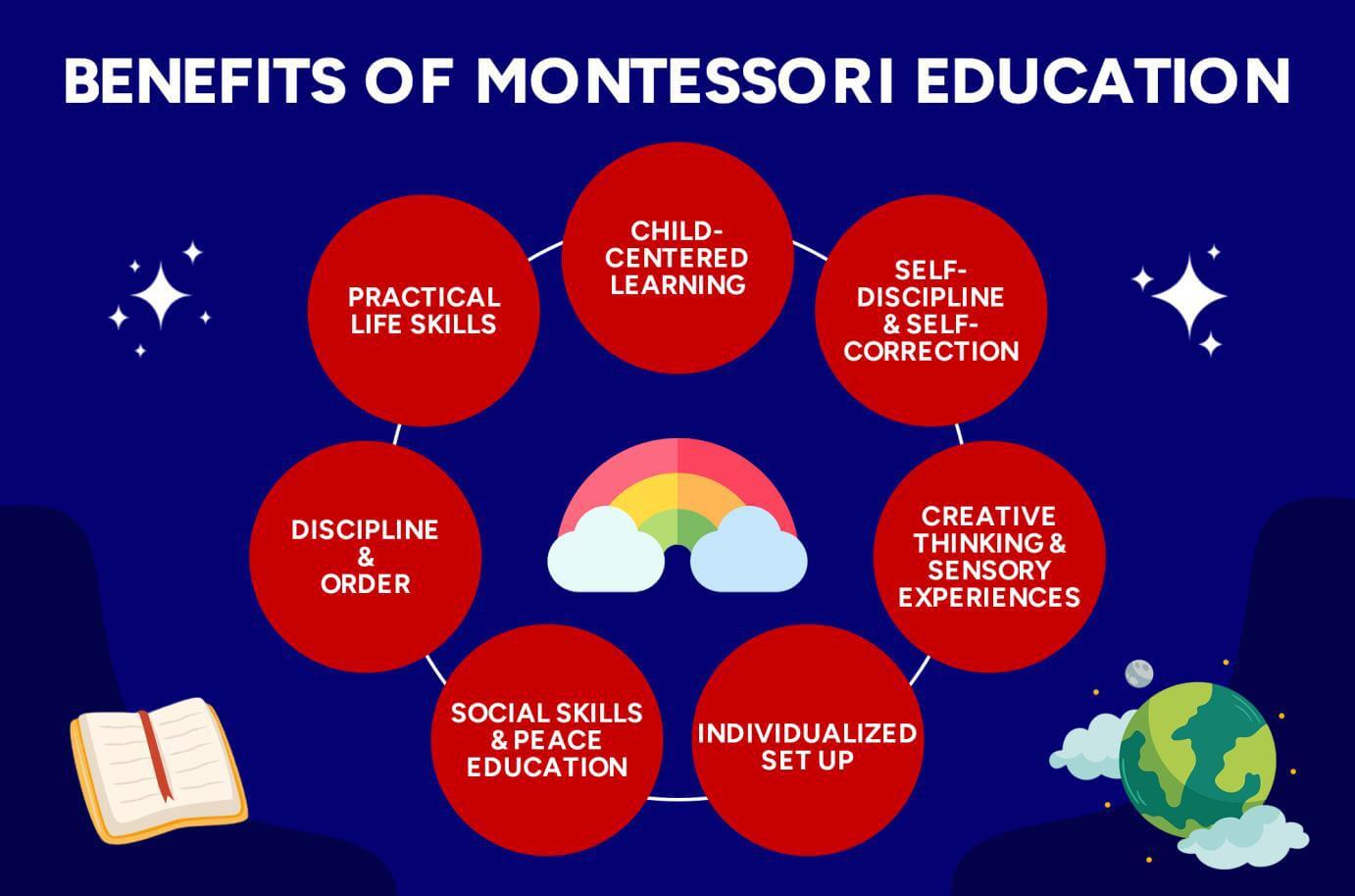
Importance of Montessori Education
The importance of Montessori education extends far beyond academic achievement. This approach nurtures essential life skills and character traits that contribute to a child’s overall well-being and success in life.
Developing Self-Confidence & Resilience
One of the benefits of Montessori education is helping children be independent and have self-control. Children learn to be responsible for what they do, make choices, and do activities with a purpose. This makes children feel ownership and motivation. It helps them become learners who guide themselves.
The Montessori way also encourages children to take on challenges and keep trying when things are hard. By letting children work at their own speed and giving them chances to correct their own mistakes, Montessori education helps children be resilient and have a growth mindset. Children learn that mistakes are a normal part of learning. They become confident to take on new challenges.
Promoting Environmental Awareness & Sustainability
Another benefit of Montessori education is that it teaches children to deeply respect nature and be aware of the environment. Children learn that all living things are connected and that it’s important to take care of the environment. Through hands-on activities like gardening, composting, and recycling, children learn to appreciate nature and understand sustainable practices.
This focus on environmental education helps children feel responsible and want to take care of the planet. It encourages children to become thoughtful global citizens who know how their actions affect the environment.
Nurturing Practical Life Skills
The Montessori approach emphasizes practical life skills important for living independently and caring for oneself. Children learn to do tasks like cooking, cleaning, and gardening. They develop important skills that will help them throughout their lives.
By learning practical life skills at a young age, children develop a sense of competence and being able to do things on their own. They gain confidence in handling everyday tasks and feel proud of what they can do. These practical skills promote independence and contribute to a child’s overall well-being and readiness for adulthood.
The Role of the Montessori Teacher
In a Montessori classroom, the role of the Montessori teacher is crucial in facilitating a child’s learning and development. Montessori teachers are trained to observe children’s interests and learning patterns, and to provide guidance and support when needed.
Facilitating Self-Directed Learning
Montessori teachers are like guides, not regular teachers. They make a special place where children can explore and learn at their own speed. Teachers show lessons and materials but then let children use them on their own.
This way, children learn to direct their own learning. They learn to take charge, make choices, and find ways to solve problems. The Montessori teacher is there to watch and help when needed.
Observing & Adapting
A big part of a Montessori teacher’s job is to watch children closely. They see what each child needs and likes. Then, they change the classroom to fit those needs.
Teachers keep an eye on how each child is doing. They give materials and activities that are just right for each child. If a child needs extra help or more challenges, the teacher can change things to make sure each child gets what they need.
Building a Respectful & Nurturing Community
Montessori teachers work hard to make their classrooms kind and caring. They show good behavior and teach children to be nice and understand each other.
By making the classroom feel like a community where everyone belongs, Montessori teachers create a place where children feel safe and supported. This helps children grow socially and emotionally. It also builds a strong base for learning and growing throughout their lives.
The Montessori Approach in Later Years
While the Montessori method is often associated with early childhood education, its principles and practices can be applied to older age groups too. Many Montessori schools offer programs for elementary and even secondary education.
Fostering Autonomy and Self-Motivation
As children get older in Montessori, learning to be independent and self-motivated becomes more important. Older students are encouraged to take charge of their learning, set goals, and manage their time well.
This helps children develop inner motivation and gets them ready for higher education and work. Montessori students learn self-discipline, time management, and responsibility. This makes them good at learning on their own and doing projects by themselves.
Integrating Interdisciplinary Learning
For older students, Montessori teaching connects different subjects to help them understand ideas better. Instead of studying subjects separately, students explore topics using different subjects together. This helps them see how things are related and why their learning matters.
For example, a lesson about the environment might include biology, chemistry, geography, and even literature or art. This gives students a full understanding of the topic from many angles. This way of learning is like the real world, where things are connected. It helps students think critically and solve hard problems that cross over different subjects.
Encouraging Collaborative Learning
As students get older in Montessori, they do more group projects and learn together. Older Montessori students work with others, share what they know and think, and learn how to communicate and work as a team.
By learning together, students learn to respect different views, find solutions, and appreciate what others are good at and how they help. These skills are very important in today’s connected world. Being able to work well in a team is valued in school and at work.
Fostering Global Citizenship & Social Responsibility
The Montessori approach for older students also focuses on being a good citizen of the world and caring about society. Students learn about different cultures, understand world problems, and develop a sense of responsibility for the environment and society.
Through community service, international trips, and talks about current events and fairness, Montessori students learn to appreciate differences and want to make the world a better place. This focus on being a good world citizen prepares students to be caring, responsible, and involved members of their communities and the world.
The Montessori Family: Bridging the Gap between Home & School
The Montessori way knows that it’s important for parents and teachers to work together to help a child grow in all ways. Montessori schools often ask families to be involved and give them help and ideas to use Montessori ideas at home.
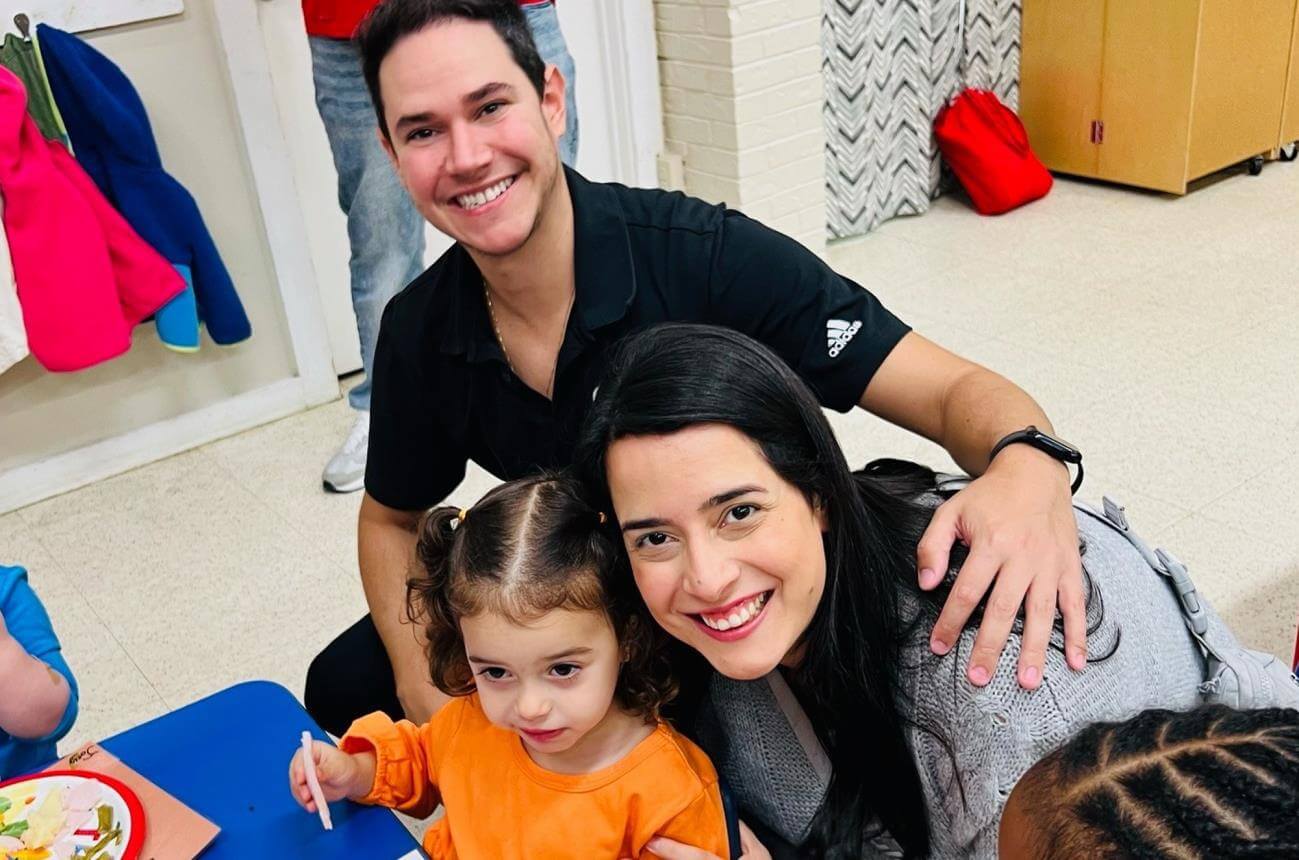
Parent Education and Involvement
Many Montessori schools have classes, workshops, and resources to help families understand and use Montessori ideas at home. These programs talk about things like making a good home environment, helping children be independent, and supporting a child’s natural curiosity and love for learning.
Montessori schools also like parents to help with classroom activities, events, and field trips. This helps make the connection between home and school stronger. It also lets parents see how their child learns and makes the school feel more like a community.
Consistency and Continuity
By connecting home and school, Montessori education helps make a child’s learning the same in both places. When parents use Montessori ideas and ways of doing things at home, children do better because things are the same in both places.
This sameness helps children have a good routine and feel stable, which can make them happier and do better in school. It also makes the values and life skills learned in the Montessori classroom stronger, so children can use these ideas in different places and situations.
Montessori Schools in Flower Mound Texas
For families in Flower Mound, Texas, and nearby areas, there are many premium Montessori schools to pick from. These schools give children a caring environment that follows Montessori ideas and helps children grow.
Montessori Episcopal School (MES)
One of the best Montessori schools in Flower Mound Texas is the Montessori Episcopal School. This school has been giving a Christian Montessori education to families in Lewisville, Flower Mound, and Highland Village for over 50 years. It is the only Christian Montessori school in Denton County.
The Montessori Episcopal School teaches each child in their own way. It has special classes every week and teaches the Bible every week. The school has three main programs (Toddler I, Toddler II, and Preparatory) for children from nine months to six years old. It also has before and after school programs.
Castle Mound Montessori
Castle Mound Montessori is a great Montessori school in Flower Mound, Texas. Since its opening in 2008, the school teaches children from 6 weeks to 9 years old. It has programs for infants, toddlers, preschoolers, and elementary students. The school hires teachers who know and follow the Montessori way of teaching.
The school has well-designed classrooms and many fun places to learn and play. There is a gym, computer room, music room, library, and play areas outside. The school’s lessons help children learn at their own speed through hands-on activities. Each program is made to fit the needs of children at different ages. Babies have a warm, caring place to grow. Older children have challenging lessons that include trips and learning in the community.
Conclusion
In short, Montessori education offers a unique and valuable approach to nurturing the whole child. By fostering independence, creativity, and a lifelong love for learning, Montessori schools in Flower Mound, Texas, provide a strong foundation for children to reach their full potential.
The benefits of Montessori programs extend far beyond academic achievement. It cultivates essential life skills, social-emotional intelligence, and a deep respect for the environment. As parents and educators, it is crucial to recognize the importance of this child-centered approach in shaping the future leaders and innovators of our society.
Discover the benefits of Montessori education for your child at Montessori Episcopal School in Lewisville, near Flower Mound. Schedule a tour today and witness how our experienced teachers nurture independence, creativity, and a lifelong love for learning.
Frequently Asked Questions
What is Montessori education?
Montessori education is a child-centered approach that focuses on the individual needs and interests of each child. It encourages hands-on learning, independence, and self-directed exploration. The Montessori method was developed by Dr. Maria Montessori. It emphasizes a prepared environment that fosters learning and growth.
What are some of the benefits of Montessori education?
Some of the benefits of Montessori education include promoting independence, self-discipline, and a love for learning. Children develop strong social and emotional skills, as well as practical life skills. The Montessori approach nurtures curiosity, critical thinking, and respect for self and others.
What is the role of the teacher in a Montessori classroom?
In a Montessori classroom, the teacher acts as a guide and facilitator rather than a traditional instructor. They observe each child’s progress and provide support and guidance when needed. The teacher creates a prepared environment that encourages exploration and helps children develop their full potential.
Can Montessori education be applied to older children?
Yes, Montessori education can be applied to older children, including elementary and secondary students. The principles of self-directed learning, interdisciplinary studies, and collaborative projects are adapted to meet the needs of older students. Montessori education prepares students for the demands of higher education and the workforce.
How can parents support Montessori education at home?
Parents can support Montessori education at home by creating a prepared environment that encourages independence and learning. They can attend parent education programs offered by Montessori schools to learn about the principles and practices. Consistency between home and school helps reinforce the values and skills taught in the classroom.
Are there any Montessori schools in Flower Mound, Texas?
Yes, there are several reputable Montessori schools in Flower Mound, Texas. Montessori Episcopal School tops among all the schools in this region. These schools offer programs for children of various ages and provide a nurturing environment that follows Montessori principles.
How does Montessori education prepare children for the future?
Montessori education equips children with essential skills and character traits that prepare them for success in the future. It fosters independence, self-motivation, and a strong work ethic. Children develop critical thinking, problem-solving abilities, and adaptability. The emphasis on social responsibility and global citizenship prepares students to become engaged and ethical members of society.

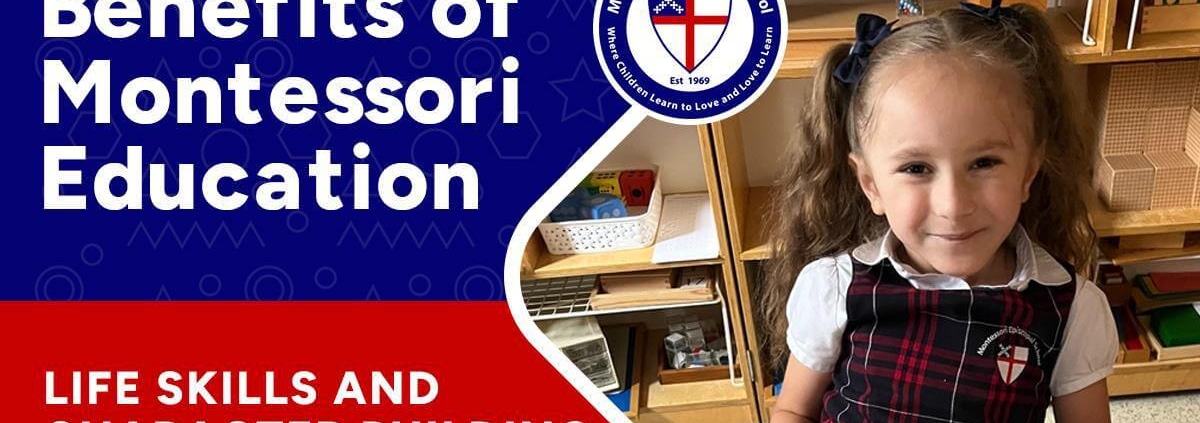
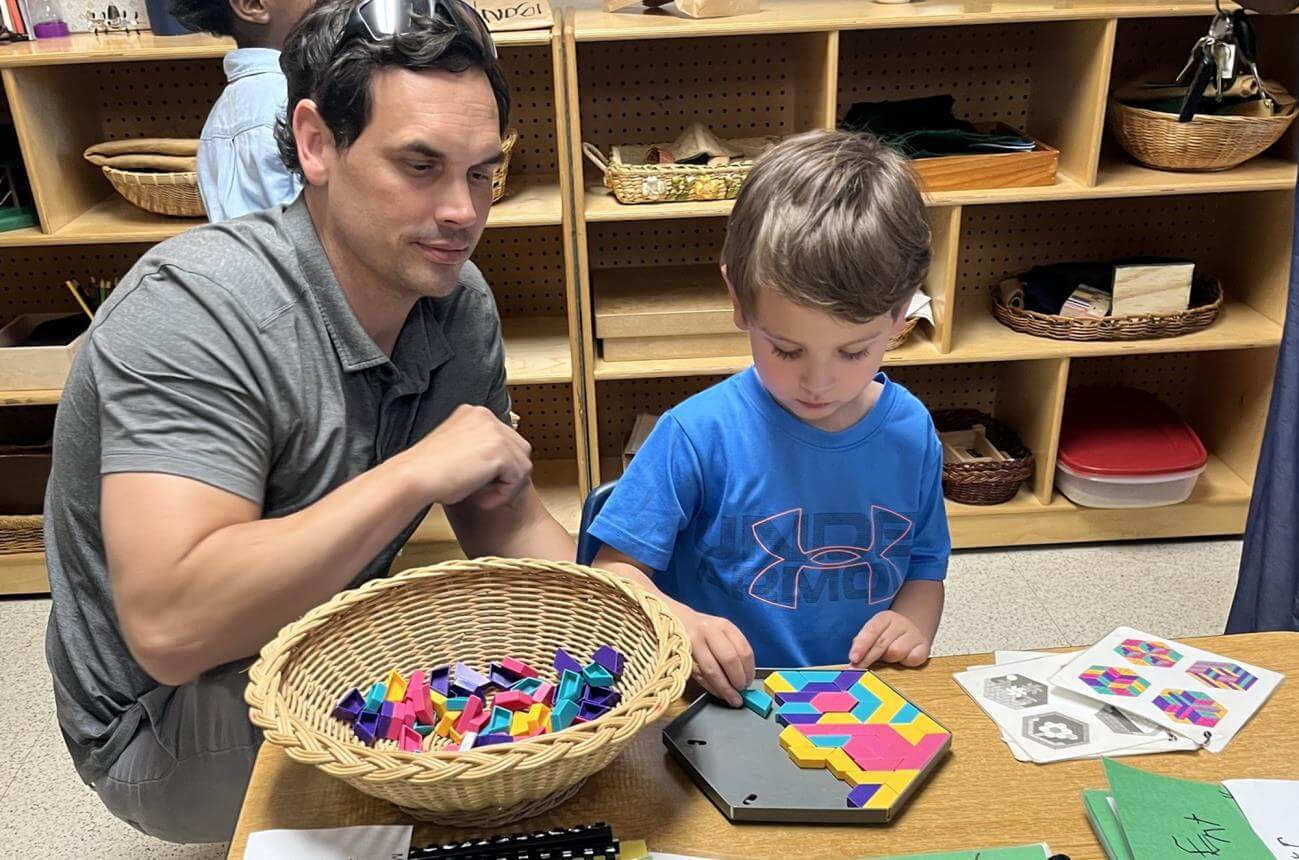
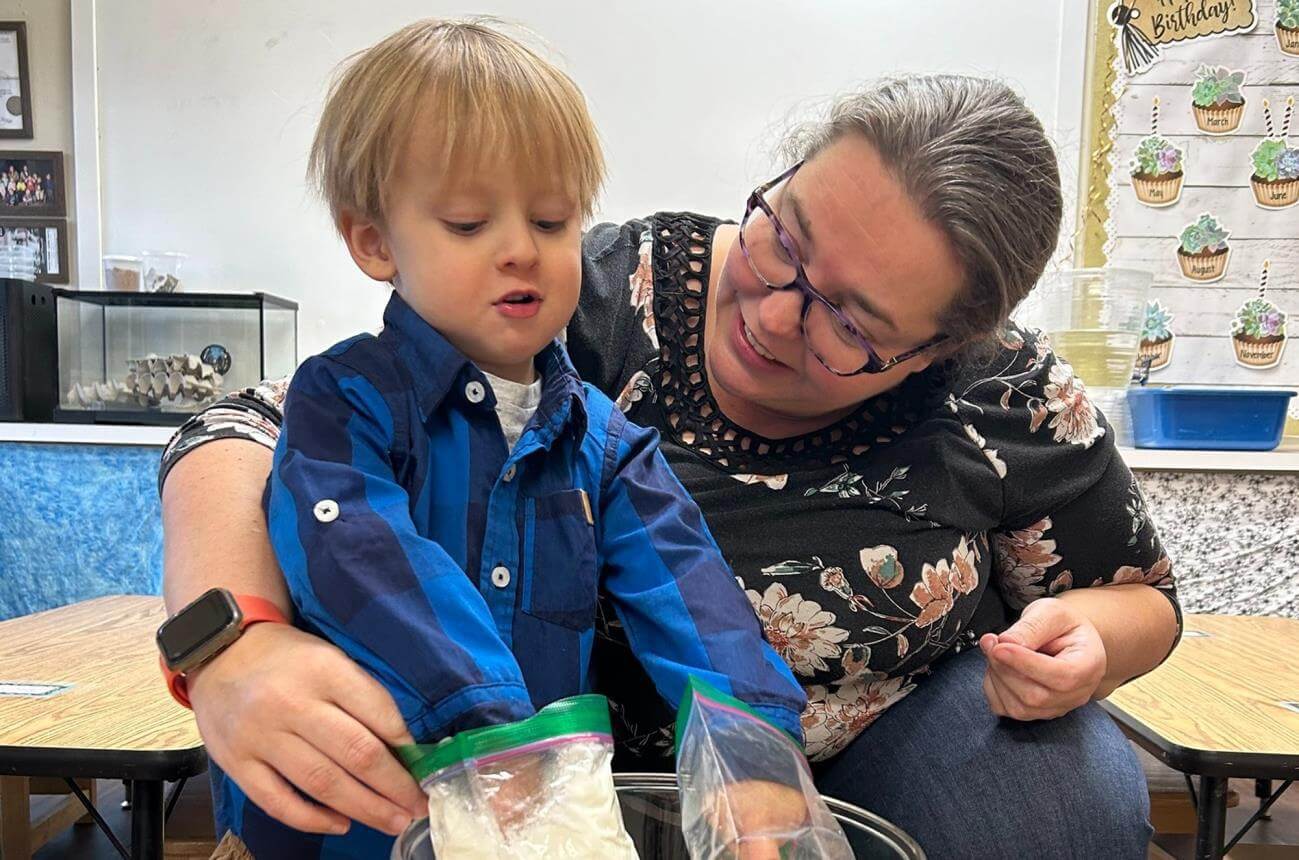


Leave a Reply
Want to join the discussion?Feel free to contribute!